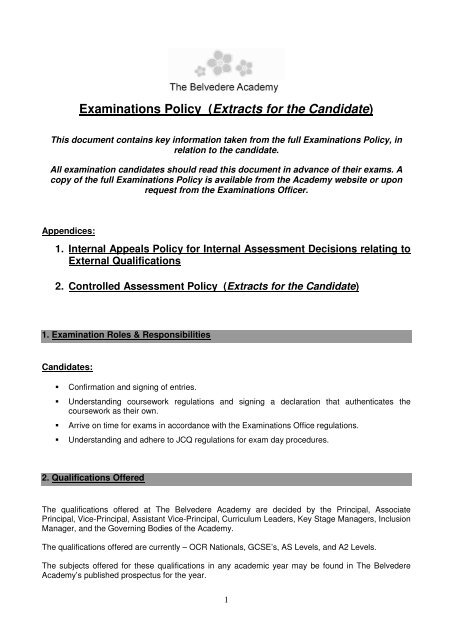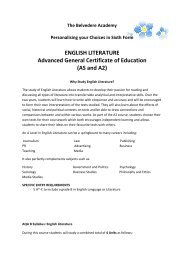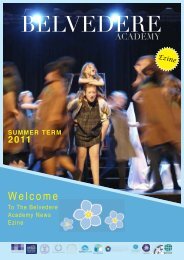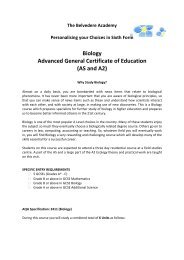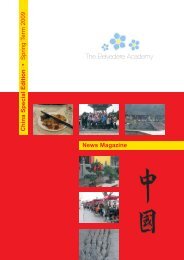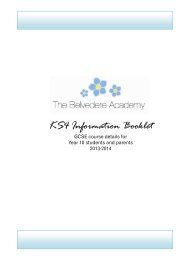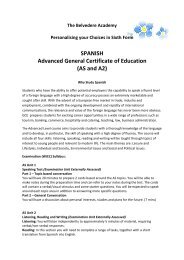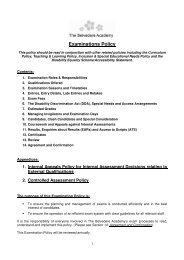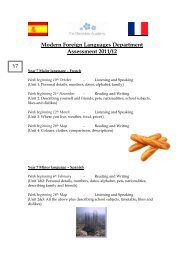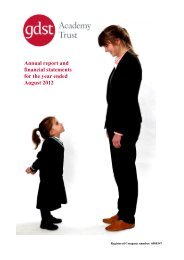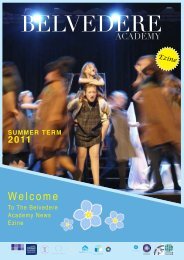Examinations Policy - The Belvedere Academy
Examinations Policy - The Belvedere Academy
Examinations Policy - The Belvedere Academy
Create successful ePaper yourself
Turn your PDF publications into a flip-book with our unique Google optimized e-Paper software.
<strong>Examinations</strong> <strong>Policy</strong> (Extracts for the Candidate)<br />
This document contains key information taken from the full <strong>Examinations</strong> <strong>Policy</strong>, in<br />
relation to the candidate.<br />
All examination candidates should read this document in advance of their exams. A<br />
copy of the full <strong>Examinations</strong> <strong>Policy</strong> is available from the <strong>Academy</strong> website or upon<br />
request from the <strong>Examinations</strong> Officer.<br />
Appendices:<br />
1. Internal Appeals <strong>Policy</strong> for Internal Assessment Decisions relating to<br />
External Qualifications<br />
2. Controlled Assessment <strong>Policy</strong> (Extracts for the Candidate)<br />
1. Examination Roles & Responsibilities<br />
Candidates:<br />
<br />
<br />
<br />
<br />
Confirmation and signing of entries.<br />
Understanding coursework regulations and signing a declaration that authenticates the<br />
coursework as their own.<br />
Arrive on time for exams in accordance with the <strong>Examinations</strong> Office regulations.<br />
Understanding and adhere to JCQ regulations for exam day procedures.<br />
2. Qualifications Offered<br />
<strong>The</strong> qualifications offered at <strong>The</strong> <strong>Belvedere</strong> <strong>Academy</strong> are decided by the Principal, Associate<br />
Principal, Vice-Principal, Assistant Vice-Principal, Curriculum Leaders, Key Stage Managers, Inclusion<br />
Manager, and the Governing Bodies of the <strong>Academy</strong>.<br />
<strong>The</strong> qualifications offered are currently – OCR Nationals, GCSE’s, AS Levels, and A2 Levels.<br />
<strong>The</strong> subjects offered for these qualifications in any academic year may be found in <strong>The</strong> <strong>Belvedere</strong><br />
<strong>Academy</strong>’s published prospectus for the year.<br />
1
At Key Stage 4:<br />
<br />
All candidates will be entitled, and prepared, to achieve an entry for qualifications from an<br />
external awarding body.<br />
At Key Stage 5:<br />
It is expected that AS modules will be completed during Year 12.<br />
3. Exam Seasons and Timetables<br />
3.1: Exam Seasons<br />
Internal exams are scheduled in November, January and June.<br />
External exams are scheduled in November, January, March and June.<br />
Internal exams in Y9 & Y11 mock examinations are held under external exam conditions.<br />
<strong>The</strong> exam series used in <strong>The</strong> <strong>Belvedere</strong> <strong>Academy</strong> is decided by the Associate Principal in liaison with<br />
the <strong>Examinations</strong> Officer and the SMT.<br />
3.2: Timetables<br />
<strong>The</strong> <strong>Examinations</strong> Officer will produce and circulate the exam timetables for both external and internal<br />
exams once these are confirmed.<br />
4. Entries, Entry Details, Late Entries and Retakes<br />
4.1: Entries<br />
Candidates are selected for their exam entries by the Curriculum Leaders, Subject Leaders, Key<br />
Stage Managers, and the Senior Management Team.<br />
A candidate or parent/guardian can request a subject entry, change of level or withdrawal in<br />
agreement with the Curriculum Leader and the Associate Principal.<br />
<strong>The</strong> <strong>Belvedere</strong> <strong>Academy</strong> only accepts entries from external candidates under certain circumstances<br />
(these are to be agreed with the Principal in advance).<br />
4.3: Retakes<br />
Retakes of examination modules are to be avoided under normal circumstances, and students need to<br />
be fully aware of the importance of them taking their initial modular studies and end exams seriously.<br />
*Please note that as of 1 st September 2012, students beginning a new GCSE course will follow the<br />
terminal course entry route, as opposed to the previous modular entry courses. Curriculum and<br />
2
Subject Leaders are responsible for ensuring that course specifications and associated exams are<br />
clearly identified, and that students are fully prepared for the key examination dates.<br />
Retaking examination modules (where allowed – see note above) can add a significant and unhelpful<br />
level of stress, as well as additional study workload to students.<br />
In certain circumstances it may however, be in the best interests of a student and/or Curriculum and<br />
Subject Area for them to retake a module or examination. Retakes should therefore in those<br />
circumstances, be considered carefully by Curriculum Leaders, Subject Leaders, Key Stage<br />
Managers, students, and their parents with regards to:<br />
<br />
<br />
<br />
<br />
<br />
<br />
<strong>The</strong> students commitment to their studies and eagerness to re-sit for genuine positive reasons<br />
<strong>The</strong> overall current and predicted workloads of the student (and the impact that adding<br />
additional study will have)<br />
<strong>The</strong> students prior targets against actual outcome<br />
<strong>The</strong> students likelihood of achieving an improved outcome as a result of re-sitting<br />
<strong>The</strong> impact that an improved modular result will have overall on the end Exam Board grade<br />
<strong>The</strong> Curriculum / Subject Area outcomes, strategy, and general advice<br />
After first considering all of the above, and gaining the signed consent of the Curriculum Leader /<br />
Subject Leader and Key Stage Manager then students will be able to apply to the <strong>Examinations</strong><br />
Officer for a retake of an individual module or exam, at their own cost (see Section 5: Exam Fees).<br />
Candidates will be allowed one retake module per subject at GCSE, subject to them gaining the full<br />
agreement of the Curriculum Leader / Subject Leader and Key Stage Manager (see above).<br />
(Candidates must pay the entry fees for any retakes in advance).<br />
Candidates will be allowed as many retakes as is allowed per subject in A2, subject to them gaining<br />
the full agreement of the Curriculum Leader / Subject Leader and Key Stage Manager (see above).<br />
(Candidates must pay the entry fees for any retakes in advance).<br />
All retake decisions need be made in consultation with the candidate, Curriculum Leader, Subject<br />
Leader, Key Stage Manager, and the Associate Principal.<br />
(See Section 5: Exam Fees)<br />
5. Exam Fees<br />
GCSE initial registration and entry exam fees are paid for by <strong>The</strong> <strong>Belvedere</strong> <strong>Academy</strong>.<br />
AS initial registration and entry exam fees are paid for by <strong>The</strong> <strong>Belvedere</strong> <strong>Academy</strong>.<br />
A2 initial registration and entry exam fees are paid for by <strong>The</strong> <strong>Belvedere</strong> <strong>Academy</strong>.<br />
Reimbursement will be sought from candidates who fail to sit an exam or meet the necessary<br />
coursework requirements.<br />
Retake fees (including Exam Board fees and invigilator costs) for first and any subsequent retakes are<br />
paid for by the candidate.<br />
Where Curriculum Area / Subject Areas request a retake (as opposed to the individual student) the<br />
retake fees (including Exam Board fees and invigilator costs) will be charged to Curriculum / Subject<br />
3
Area capitations or the central <strong>Academy</strong> <strong>Examinations</strong> budget, in certain circumstances which are<br />
agreed with the Associate Principal.<br />
(See Section 4.3: Retakes)<br />
Candidates must pay the fee for an enquiry about a result, should the <strong>Academy</strong> not uphold the enquiry<br />
and the candidate insists on pursuing the enquiry.<br />
(See Section 11.2: Enquiries about Results [EARs])<br />
6. <strong>The</strong> Disability Discrimination Act (DDA), Special Needs and Access Arrangements<br />
6.1: DDA<br />
<strong>The</strong> Disability Discrimination Act 2005 extends the application of the DDA to general qualifications. All<br />
exam centre (<strong>Belvedere</strong> <strong>Academy</strong>) staff must ensure that the access arrangements and special<br />
consideration regulations and guidance are consistent with the law. This policy should be read in<br />
conjunction with the <strong>Academy</strong> Disability Equality Scheme/Accessibility Statement. Every effort will be<br />
made to ensure that ALL students will be able to access their end of course examinations.<br />
6.2: Special Needs<br />
A candidate’s special needs requirements are determined by the SENCO/Inclusion Manager, Doctor<br />
and the Educational Psychologist / Specialist Teacher.<br />
We strongly recommend to all parents and students that all external cognitive assessments are carried<br />
out by a chartered Educational Psychologist.<br />
<strong>The</strong> deadline for handing in external diagnostic reports for the current exam season is the 19th<br />
October 2012. If the <strong>Academy</strong> receives an external report later than that, recommendations for access<br />
arrangements (i.e. additional time in examinations) can be processed and implemented only for the<br />
next exam season (2013/14).<br />
<strong>The</strong> SENCO/Inclusion Manager will inform subject teachers of candidates with special educational<br />
needs who are embarking on a course leading to an exam, and the date of that exam (once<br />
confirmed). <strong>The</strong> SENCO/Inclusion Manager can then inform individual staff of any special<br />
arrangements that individual candidates may be granted during the course and in the exam.<br />
9. Candidates, Clash Candidates and Special Consideration<br />
9.1: Candidates<br />
<strong>The</strong> <strong>Belvedere</strong> <strong>Academy</strong>’s published rules on acceptable dress, behaviour and candidates’ use of<br />
mobile phones and all electronic devices apply at all times.<br />
Candidates’ personal belongings remain their own responsibility and <strong>The</strong> <strong>Belvedere</strong> <strong>Academy</strong> accepts<br />
no liability for their loss or damage.<br />
Disruptive candidates are dealt with in accordance with JCQ guidelines.<br />
4
Candidates may leave the exam room for a genuine purpose requiring an immediate return to the<br />
exam room, in which case a member of invigilation staff must accompany them.<br />
9.2: Clash Candidates<br />
<strong>The</strong> <strong>Examinations</strong> Officer will be responsible as necessary for identifying escorts, identifying a secure<br />
venue and arranging overnight stays.<br />
9.3: Special Consideration<br />
Should a candidate be too ill to sit an exam, suffer bereavement or other trauma or be taken ill during<br />
the exam itself, it is the candidate’s responsibility to alert the <strong>Academy</strong>, <strong>Examinations</strong> Officer, or the<br />
exam invigilator, to that effect.<br />
Any special consideration claim must be supported by appropriate evidence within five days of the<br />
exam, for example a letter from the candidate’s doctor.<br />
<strong>The</strong> <strong>Examinations</strong> Officer will then forward a completed special consideration form to the relevant<br />
awarding body within seven days of the exam.<br />
10. Coursework and Appeals against Internal Assessments<br />
10.1: Coursework<br />
Candidates who have to prepare portfolios should do so by the end of the course or <strong>Academy</strong> defined<br />
date.<br />
10.2: Appeals against Internal Assessments<br />
<strong>The</strong> <strong>Belvedere</strong> <strong>Academy</strong> is obliged to publish a separate procedure on this subject (Appendix 1); and<br />
which is also available from the Exams Office.<br />
<strong>The</strong> main points are:<br />
<br />
<br />
<br />
<br />
Appeals will only be entertained if they apply to the process leading to an assessment. <strong>The</strong>re is<br />
no appeal against the mark or grade awarded.<br />
Candidates may appeal if they feel their coursework has been assessed unfairly, inconsistently<br />
or not in accordance with the specification for the qualification.<br />
Appeals should be made in writing by 30 th June to the Principal (or other nominee) who will<br />
decide whether the process used conformed to the necessary requirements.<br />
<strong>The</strong> Principal’s findings will be made available in writing, copied to the <strong>Examinations</strong> Officer<br />
and recorded for awarding body inspection.<br />
11. Results, Enquiries about Results (EARs) and Access to Scripts (ATS)<br />
11.1: Results<br />
5
Candidates will receive individual results slips on results days in person at <strong>The</strong> <strong>Belvedere</strong> <strong>Academy</strong>.<br />
<strong>The</strong> <strong>Belvedere</strong> <strong>Academy</strong> aggregates at the end of Year 12 for AS grades.<br />
11.2: EARs (Enquiries about Results)<br />
EARs may be requested by <strong>Academy</strong> staff or candidates if there are reasonable grounds for believing<br />
there has been an error in marking.<br />
Individual students may request an EAR re-mark via the <strong>Examinations</strong> Officer, after they themselves<br />
have firstly discussing it fully with the relevant Curriculum Leader / Subject Leader. Any individual<br />
student who requests an EAR re-mark must meet the potential costs of this in full themselves.<br />
(See Section 5: Exam Fees)<br />
11.3: ATS (Access to Scripts)<br />
After the release of results, candidates may ask subject staff to request the return of papers within<br />
three days following scrutiny of the results.<br />
If a result is queried, the <strong>Examinations</strong> Officer, Curriculum Leaders, Subject Leaders, and the<br />
Associate Principal will investigate the feasibility of asking for a re-mark at the <strong>Academy</strong>’s expense.<br />
GCSE re-marks cannot be applied for once a script has been returned.<br />
12. Certificates<br />
Certificates are presented in person, collected and signed for. Certificates may be collected on behalf<br />
of a candidate by a third party, provided they have been authorised to do so.<br />
<strong>The</strong> <strong>Belvedere</strong> <strong>Academy</strong> retains certificates for three years.<br />
appropriate Exam Boards.<br />
<strong>The</strong>y will then be returned to the<br />
6
Appendix 1:<br />
Internal Appeals <strong>Policy</strong> for Internal Assessment Decisions relating to<br />
External Qualifications<br />
<strong>The</strong> <strong>Belvedere</strong> <strong>Academy</strong> is committed to ensuring that whenever staff assess students’ work for external<br />
qualification, this is done fairly, consistently and in accordance with the specification for the qualification<br />
concerned. Assessments should be conducted by staff who have appropriate knowledge, understanding and<br />
skills, and who have been trained in this activity. Students’ work should be produced and authenticated<br />
according to the requirements of the <strong>Examinations</strong> Board. Where a set of work is divided between staff,<br />
consistency should be assured by internal moderation and standardisation.<br />
If a student feels that this may not have happened in relation to her work, she may make use of this appeals<br />
procedure. Note that appeals may only be made against the process that led to the assessment and not against<br />
the mark or grade.<br />
<strong>The</strong> existence of this procedure is made known to students and parents. This procedure is available from the<br />
Examination Officer and the <strong>Academy</strong> Website www.belvedereacademy.net<br />
Appeals Procedure<br />
1. Appeals should be made as soon as possible, and must be made two weeks before the end of the<br />
last externally assessed paper in the examinations series. (So the appeal must be made before a<br />
date in mid-June for the summer series as presently timetabled).<br />
2. Appeals should be made in writing to the <strong>Examinations</strong> Officer, who will in conjunction with the<br />
Associate Principal investigate the appeal. If the <strong>Examinations</strong> Officer or Associate Principal were<br />
directly involved in the assessment in question, the Principal will appoint another member of staff of<br />
similar or greater seniority to conduct the investigation. Likewise if the Examination Officer or<br />
Associate Principal is not able to conduct the investigation for some other reason.<br />
3. <strong>The</strong> <strong>Examinations</strong> Officer and Associate Principal, or other member of staff will decide whether the<br />
process used for the internal assessment conformed to the requirements of the awarding body and<br />
the examinations code of practice of the Qualifications & Curriculum Authority (QCA). This will be<br />
done before the end of the series (currently the end of June for the summer series). All<br />
investigations will be reported to the Principal as Head of Centre, before any final conclusions on the<br />
appeal are made.<br />
4. You will be informed in writing of the outcome of the appeal, including any correspondence with the<br />
<strong>Examinations</strong> Board, any changes made to the assessment of your work, and any changes made to<br />
improve matters in the future.<br />
5. <strong>The</strong> outcome of the appeal will be made known to the Principal, and will be logged as a complaint<br />
under the complaints procedure. A written record of the appeal will be kept and made available to<br />
the awarding body at their request. Should the appeal bring any significant irregularity to light, the<br />
awarding body will be informed.<br />
6. If the appellant is unhappy with the decision made, the parent or student may ask for a personal<br />
hearing, where the panel will consist of two persons not previously involved, normally including the<br />
Principal, Associate Principal, or Vice Principal.<br />
After work has been assessed internally it is moderated by the awarding body (<strong>Examinations</strong> Board) to ensure<br />
consistency between centres. Such moderation frequently changes the marks awarded for internally assessed<br />
work. That is outside the control of <strong>The</strong> <strong>Belvedere</strong> <strong>Academy</strong> and is not covered by this procedure. If you have<br />
concerns about it, please ask the <strong>Examinations</strong> Officer for a copy of the appeals procedure of the relevant<br />
<strong>Examinations</strong> Board.<br />
Last Revised and Modified: September 2012<br />
7
Appendix 2:<br />
Controlled Assessment <strong>Policy</strong> (Extracts for the Candidate)<br />
Controlled assessment is a form of internal assessment where control levels are set for each<br />
stage of the assessment process: task setting, task taking and task marking.<br />
Absence:<br />
Curriculum/Subject Leaders will accommodate the occasional absence of a candidate by ensuring that an<br />
opportunity is given to them to make up missed controlled assessment. An alternative supervised session will be<br />
organised for such candidates.<br />
Should a candidate miss controlled assessment sessions persistently and/or without prior notice her parents will<br />
be contacted by the Curriculum/Subject Leader in the first instance to discuss the situation.<br />
Repeat Submission:<br />
Candidates who wish to re-do their submission of a controlled assessment before the marks have been sent to<br />
the awarding body may do so, at the discretion of the <strong>Academy</strong>, under specified conditions.<br />
Missed Deadlines:<br />
Subject teachers and Curriculum/Subject Leaders will make every effort to support candidates so that they<br />
submit work to meet published internal deadlines. Where there is a danger of a deadline being missed, the<br />
Curriculum/Subject Leader will contact parents to discuss the matter.<br />
However no controlled assessment will be accepted by the <strong>Academy</strong> after published final deadlines. In such<br />
cases the candidate will be given either a mark for any incomplete work submitted or a zero mark if no work is<br />
submitted.<br />
Internal Marks:<br />
All candidates upon request have a right of access to the marks awarded to them by the <strong>Academy</strong> for internal<br />
assessment. <strong>The</strong> <strong>Academy</strong> may inform candidates of the marks which have been submitted to the awarding<br />
body, but in doing so must make it clear that those marks are subject to change through the moderation process.<br />
Malpractice:<br />
Candidates must not:<br />
<br />
<br />
<br />
<br />
<br />
Submit work which is not their own;<br />
Lend their own work to others or allow their work to be copied;<br />
Allow others access to, or the use of, their own independently sourced material;<br />
Use any books, the internet or other sources without acknowledgement or attribution;<br />
Submit work word processed by a third party without acknowledgement.<br />
<strong>The</strong>se actions constitute malpractice, for which a penalty, (e.g. disqualification from the assessment)<br />
will be applied.<br />
<br />
<br />
If irregularities in controlled assessments are discovered prior to the candidate signing the declaration of<br />
authentication this will be dealt with under the <strong>Academy</strong>’s internal procedures. Details of any work which<br />
is not the candidate’s own will be recorded on the authentication form supplied by the awarding body or<br />
other appropriate place.<br />
If irregularities in controlled assessments are identified by the <strong>Academy</strong> after the candidate has signed<br />
the declaration of authentication, the Principal will submit full details of the case to the relevant awarding<br />
body at the earliest opportunity.<br />
8


